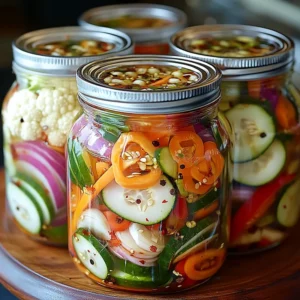
Easy Refrigerator Pickled Vegetables
Do you ever find yourself with a fridge full of beautiful veggies, maybe just a few lonely carrots, a half-used bell pepper, or some green beans that are looking a little sad? Before you even think about letting them go to waste, let me introduce you to my absolute favorite way to give them a delicious second life: Easy Refrigerator Pickled Vegetables! Trust me, once you make a batch of these, you'll be finding excuses to pickle everything. It's like magic in a jar – transforming simple produce into vibrant, tangy, crunchy bites that are perfect for snacking, topping salads, or adding a pop of flavor to just about anything. Forget complicated canning; this is the quick, no-fuss method that anyone can master. Get ready to fall in love with pickling!
Equipment
- Jar(s) Pint or quart jars work great
- Medium saucepan
Ingredients
Vegetables & Spices
- 1 cup Carrots Cut into sticks, coins, or crinkle-cut slices
- 2 cups Cauliflower florets Break down into bite-sized pieces
- 1 cup Cucumbers Sliced or cut into spears. Use firm cucumbers like Kirby or English
- 3 cloves Garlic Lightly smashed or sliced
- 1 cup Green beans Trimmed
- 1 Red bell pepper Sliced or cut into strips
- 2 tsp Mustard seeds
- 1 tsp Black peppercorns
- 0.5 tsp Red pepper flakes Adjust this to your spice preference!
Brine
- 2 tbsp Salt Kosher or non-iodized table salt
- 1 tbsp Sugar
- 2 cups White vinegar Basic distilled white vinegar
- 2 cups Water
Instructions
- Prep Your Veggies: Start by washing and chopping all your beautiful vegetables. Aim for pieces that are roughly similar in size so they pickle evenly, and small enough to fit nicely into your jars. Think bite-sized florets, strips, or sticks.
- Pack the Jars: Grab some clean jars (pint or quart jars work great). Tightly pack the chopped vegetables into the jars. Don't be afraid to really get them in there, but leave about a half-inch of space at the top. Distribute the garlic cloves and spices (mustard seeds, peppercorns, red pepper flakes) among the jars as you pack the veggies.
- Make the Brine: In a medium saucepan, combine the white vinegar, water, salt, and sugar. Stir everything together.
- Boil the Brine: Bring the mixture to a rolling boil over medium-high heat, stirring occasionally to make sure the salt and sugar dissolve completely. Let it boil for just about a minute.
- Pour the Brine: Carefully pour the hot brine over the vegetables in the jars, making sure the veggies are completely submerged. Tap the jars gently on the counter to release any air bubbles. Leave a little headspace at the top.
- Seal and Cool: Wipe the rims of the jars clean with a damp cloth. Place the lids on tightly. Let the jars sit at room temperature until they've cooled down significantly, about an hour or so.
- Chill Out: Once cool, pop those jars into the refrigerator. This is where the magic really happens! They need at least 24 hours (but ideally 48 hours or more) in the fridge for the flavors to meld and the veggies to get properly pickled and crunchy.
Notes
The beauty of refrigerator pickles? You can customize them endlessly! Try pickling sliced onions, jalapeños, radishes, asparagus spears, broccoli florets, or even cherry tomatoes. Add fresh dill sprigs, bay leaves, sprigs of thyme, or rosemary. Cumin seeds, coriander seeds, or celery seed can add different dimensions. For a slightly different flavor, try swapping some of the white vinegar for apple cider vinegar, rice vinegar, or white wine vinegar. Keep the total amount of vinegar and water the same. You can slightly adjust the amount of sugar. Start with firm, fresh vegetables. Pack tightly, but don't bruise. Make sure the hot brine completely covers all the vegetables. Give the pickles at least 24-48 hours in the fridge. Starting with clean jars is always a good practice. Keep the jars sealed tightly and stored in your refrigerator. They will stay crisp and delicious for several weeks, usually up to 2-3 months. Do not reuse the brine. These are not safe for long-term storage outside the fridge.